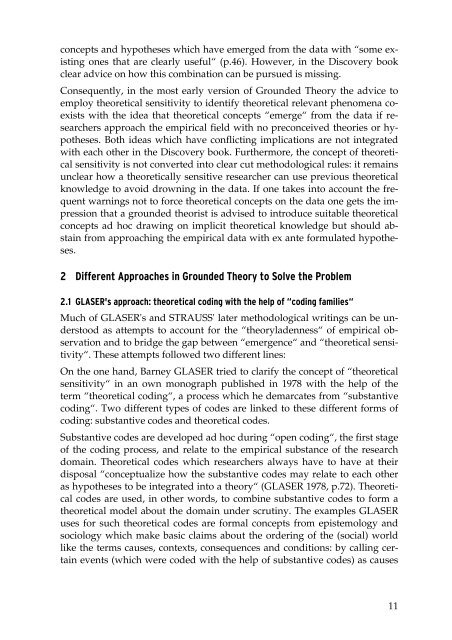Volltext - SSOAR
Volltext - SSOAR
Volltext - SSOAR
- TAGS
- volltext
- ssoar
- www.ssoar.info
Sie wollen auch ein ePaper? Erhöhen Sie die Reichweite Ihrer Titel.
YUMPU macht aus Druck-PDFs automatisch weboptimierte ePaper, die Google liebt.
concepts and hypotheses which have emerged from the data with “some existing<br />
ones that are clearly useful“ (p.46). However, in the Discovery book<br />
clear advice on how this combination can be pursued is missing.<br />
Consequently, in the most early version of Grounded Theory the advice to<br />
employ theoretical sensitivity to identify theoretical relevant phenomena coexists<br />
with the idea that theoretical concepts “emerge“ from the data if researchers<br />
approach the empirical field with no preconceived theories or hypotheses.<br />
Both ideas which have conflicting implications are not integrated<br />
with each other in the Discovery book. Furthermore, the concept of theoretical<br />
sensitivity is not converted into clear cut methodological rules: it remains<br />
unclear how a theoretically sensitive researcher can use previous theoretical<br />
knowledge to avoid drowning in the data. If one takes into account the frequent<br />
warnings not to force theoretical concepts on the data one gets the impression<br />
that a grounded theorist is advised to introduce suitable theoretical<br />
concepts ad hoc drawing on implicit theoretical knowledge but should abstain<br />
from approaching the empirical data with ex ante formulated hypotheses.<br />
2 Different Approaches in Grounded Theory to Solve the Problem<br />
2.1 GLASER's approach: theoretical coding with the help of “coding families“<br />
Much of GLASER's and STRAUSS' later methodological writings can be understood<br />
as attempts to account for the “theoryladenness“ of empirical observation<br />
and to bridge the gap between “emergence“ and “theoretical sensitivity“.<br />
These attempts followed two different lines:<br />
On the one hand, Barney GLASER tried to clarify the concept of “theoretical<br />
sensitivity“ in an own monograph published in 1978 with the help of the<br />
term “theoretical coding“, a process which he demarcates from “substantive<br />
coding“. Two different types of codes are linked to these different forms of<br />
coding: substantive codes and theoretical codes.<br />
Substantive codes are developed ad hoc during “open coding“, the first stage<br />
of the coding process, and relate to the empirical substance of the research<br />
domain. Theoretical codes which researchers always have to have at their<br />
disposal “conceptualize how the substantive codes may relate to each other<br />
as hypotheses to be integrated into a theory“ (GLASER 1978, p.72). Theoretical<br />
codes are used, in other words, to combine substantive codes to form a<br />
theoretical model about the domain under scrutiny. The examples GLASER<br />
uses for such theoretical codes are formal concepts from epistemology and<br />
sociology which make basic claims about the ordering of the (social) world<br />
like the terms causes, contexts, consequences and conditions: by calling certain<br />
events (which were coded with the help of substantive codes) as causes<br />
11

















